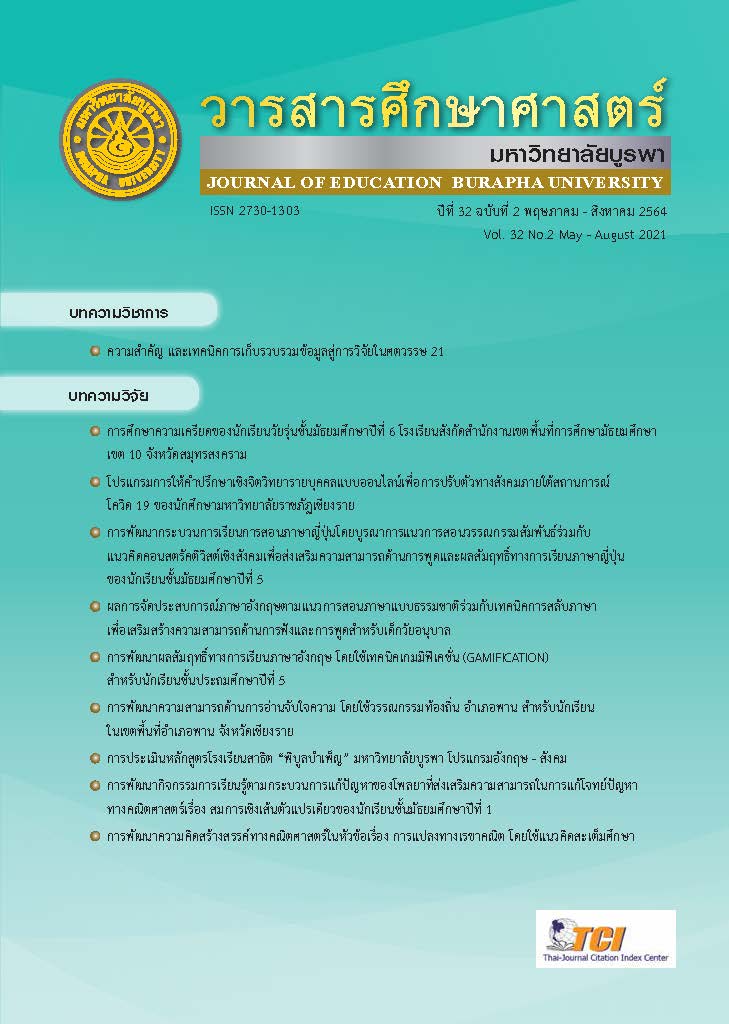การพัฒนาผลสัมฤทธิ์ทางการเรียนภาษาอังกฤษ โดยใช้เทคนิคเกมมิฟิเคชั่น(GAMIFICATION) สำหรับนักเรียนชั้นประถมศึกษาปีที่ 5
คำสำคัญ:
เกมมิฟิเคชั่น, ผลสัมฤทธิ์ทางการเรียน, ภาษาอังกฤษบทคัดย่อ
การวิจัยครั้งนี้ มีวัตถุประสงค์ เพื่อเปรียบเทียบผลสัมฤทธิ์ทางการเรียนก่อนเรียนและหลังเรียนด้วยกิจกรรมการเรียนการสอนโดยใช้เทคนิคเกมมิฟิเคชั่น (Gamification) และเพื่อศึกษาความพึงพอใจของนักเรียนต่อกิจกรรมการเรียนการสอนโดยใช้เทคนิคเกมมิฟิเคชั่น (Gamification) โดยประชากร ได้แก่ นักเรียนชั้นประถมศึกษาปีที่ 5 โรงเรียนบ้านทุ่งทอง อำเภอบึงนาราง จังหวัดพิจิตร และกลุ่มตัวอย่าง ได้แก่ นักเรียนชั้นประถมศึกษาปีที่ 5 โรงเรียนบ้านทุ่งทอง อำเภอบึงนาราง จังหวัดพิจิตร ที่กำลังศึกษาอยู่ในภาคเรียนที่ 2 ปีการศึกษา 2563 จำนวน 18 คน ซึ่งได้มาโดยการเลือกกลุ่มตัวอย่างแบบไม่อาศัยทฤษฎีความน่าจะเป็น (Nonprobability sampling) โดยใช้การเลือกกลุ่มตัวอย่างแบบเจาะจง (Purposive sampling)เครื่องมือที่ใช้ในการวิจัย ประกอบด้วย แผนการจัดการเรียนรู้ที่จัดกิจกรรมการเรียนการสอนโดยใช้เทคนิคเกมมิฟิเคชั่น (Gamification) แบบทดสอบวัดผลสัมฤทธิ์ทางการเรียนวิชาภาษาอังกฤษโดยใช้เทคนิคเกมมิฟิเคชั่น (Gamification) และแบบสอบถามความพึงพอใจของนักเรียนต่อกิจกรรมการเรียนการสอนโดยใช้เทคนิคเกมมิฟิเคชั่น (Gamification) สถิติที่ใช้ในการวิเคราะห์ข้อมูล ได้แก่ ค่าเฉลี่ย () ส่วนเบี่ยงเบนมาตรฐาน (SD) และค่า t-test (Dependent Samples)
ผลการวิจัยพบว่า ผลสัมฤทธิ์ทางการเรียนภาษาอังกฤษของนักเรียนชั้นประถมศึกษาปีที่ 5 หลังเรียนด้วยกิจกรรมการเรียนการสอนโดยใช้เทคนิคเกมมิฟิเคชั่น (Gamification) สูงกว่าก่อนเรียนอย่างมีนัยสําคัญทางสถิติที่ระดับ .05 และความพึงพอใจของนักเรียนต่อกิจกรรมการเรียนการสอนภาษาอังกฤษโดยใช้เทคนิคเกมมิฟิเคชั่น (Gamification) อยู่ในระดับพึงพอใจมาก ( = 3.65, SD = 0.24)
เอกสารอ้างอิง
Barata, G., Gama, S., Jorge, J. and Gonçalves, D. (2013). Engaging engineering students with gamification. Retrieved September 8, 2020, from http://dx.doi.org/10.1109/VS- GAMES.2013.6624228
Dehghanzadeh, H., Fardanesh, H., Hatami, J. and Talaee, E. (2019). Using gamification to support learning English as a second language: a systematic review. Retrieved September 25, 2020 from http://dx.doi.org/10.1080/9588221.2019.1648298
Dominquez, A., Saenz-de-Navarrete, J., de-Marcos, L., Fernández-Sanz, L., Pagés, C. and Martínez-Herráiz, J.J. (2013) Gamifying learning experiences: Practical implications and outcomes. Retrieved September 26, 2020 from https://doi.org/10.1016/j.compedu.2012.12.020
Francisco, J. F. F. (2015) Using Gamification to Enhance Second Language Learning. Retrieved September 30, 2020 from https://files.eric.ed.gov/fulltext/EJ1065005.pdf
Garland, M. C. (2015) Gamification and Implications for Second Language Education: A Meta Analysis. Retrieved September 10, 2020 from https://core.ac.uk/download/pdf/232791936.pdf
Lui, S. (2017) Use of Gamification in Vocabulary Learning: A Case Study in Macau. Retrieved September 18, 2020 from https://www.nus.edu.sg/celc/research/books/4th%20Symposium%20proceedings/1 3).%20Sze%20Lui.pdf
Rodríguez, H. T. (2018). Gamification and Game-Based Learning as Methods to Motivate Students Learn English Vocabulary. Retrieved September 28, 2020 from http://riull.ull.es/xmlui/handle/915/11550
Sandusky, S. (2015). Gamification in Education. Retrieved September 10, 2020, from https://repository.arizona.edu/handle/10150/556222?fbclid=IwAR2ULgAeRgj7n I_7AoNaHeep_KQFuRWwS7OFEq1ym9_OCBL40IK5YFxvi
ดาวน์โหลด
เผยแพร่แล้ว
รูปแบบการอ้างอิง
ฉบับ
ประเภทบทความ
สัญญาอนุญาต
ลิขสิทธิ์ของบทความที่ปรากฏในวารสารศึกษาศาสตร์ มหาวิทยาลัยบูรพา เป็นของวารสารศึกษาศาสตร์ มหาวิทยาลัยบูรพา ทั้งนี้บทความทุกเรื่องผ่านการตรวจสอบความถูกต้องทางวิชาการจากผู้ทรงคุณวุฒิ ข้อความและข้อมูลของบทความในวารสารฯ เป็นแนวคิดของผู้แต่ง มิใช่เป็นความคิดเห็นของกองบรรณาธิการ และมิใช่ความรับผิดชอบของคณะศึกษาศาสตร์ มหาวิทยาลัยบูรพา ไม่สงวนลิขสิทธิ์การนำไปใช้ประโยชน์ทางวิชาการแต่ต้องอ้างอิงแสดงแหล่งที่มาและอยู่ในขอบเขตของกฎหมายลิขสิทธิ์



